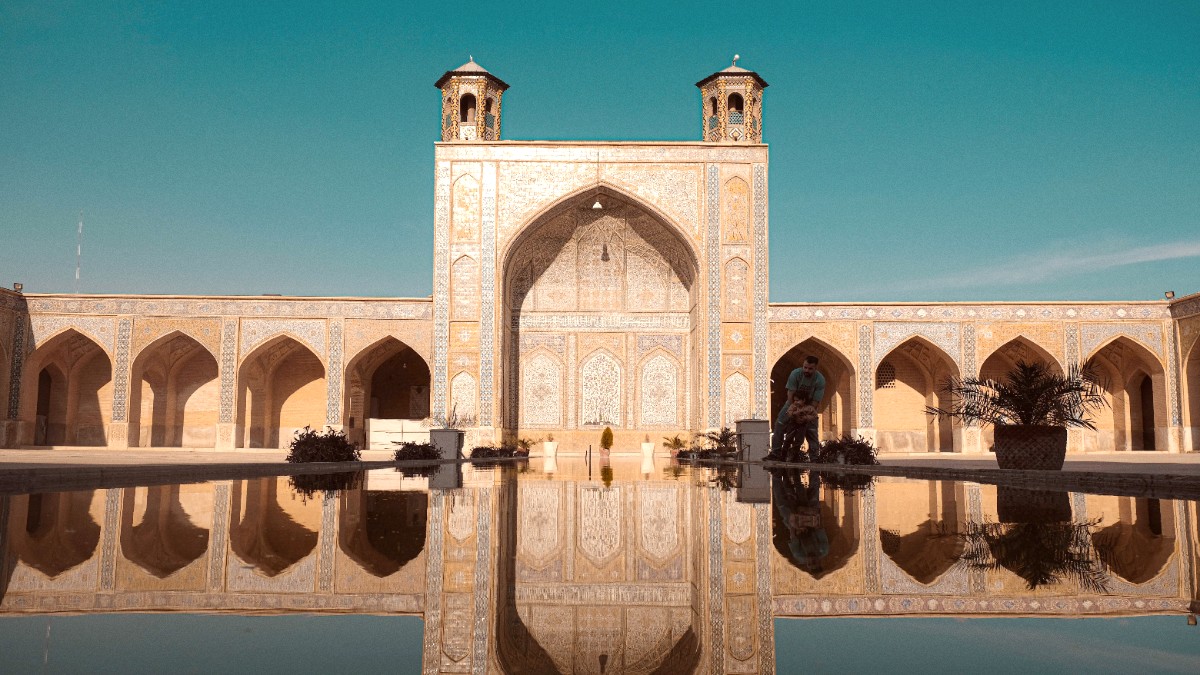
Iran
Shirazi cuisine is known for its fresh ingredients, abundant herbs, and delicate flavors, often balancing sweet and sour notes. This mirrors the city's historical prosperity and garden bounty.
The region is famous for citrus fruits—oranges, limes, pomegranates—which feature prominently. Shiraz historically had a connection to wine, hinting at its agricultural richness.
A complex system of politeness. When someone extends an offer, it is polite to politely decline once or twice before accepting.
Shoes are removed when entering traditional restaurants with platform seating. Persians mainly use a fork and spoon for eating. Dishes are often shared family-style.
Alcohol is strictly prohibited throughout Iran and is never served publicly. Non-alcoholic beers and traditional non-alcoholic drinks are common.
This signature Shirazi dish features rice cooked with shredded cabbage, small meatballs, and aromatic herbs like tarragon and dill, for a fragrant, flavorful meal.
A thick pomegranate soup, popular in autumn. Made with rice, chickpeas, meat (or vegetarian versions), it gains its distinctive sour taste from pomegranate juice.
A seasonal delight.
A traditional Persian frozen dessert, unique to Shiraz. Made from thin vermicelli noodles frozen with rosewater, sugar, and lime juice. Often served with sour cherry syrup or extra lime juice.
Find this refreshing treat from street vendors.
This area presents excellent opportunities for local snacks, traditional sweets, and small eateries, for an authentic taste of Shirazi street food.
Several upscale restaurants in luxury hotels or modern city areas offer refined Persian and international cuisine. Mid-range options are abundant throughout Shiraz.
While Persian cuisine often features meat, vegetarian dishes are available. These include lentil-based stews (Adasi), various "Ash" (thick soups), and numerous vegetable sides.
All meat served in Iran is Halal according to Islamic dietary laws. Kosher food is not widely available, but vegetarian or vegan options suit those observing kosher diets.
Awareness of specific allergens like gluten is not widespread. Carrying a translation card explaining your dietary restrictions is advisable.
Local tour operators and guesthouses offer cooking classes on Persian or Shirazi cuisine. These often include a market visit for ingredient selection.
These experiences Deepen your understanding of local food.
Food tours exploring the Vakil Bazaar and local eateries provide insights into local culinary traditions.
Discover authentic flavors and ingredients.
Many provide live traditional music in the evenings.
Growing in northern Shiraz, these offer relaxed evening socializing.
Popular around Hafezieh, Saadieh, and Quran Gate for socializing.
Due to local laws, alcohol is not served publicly.
Experience historical settings.
Rooftop cafes present city views while enjoying a meal or a drink.
Enjoy scenic panoramas.
Look for Faloodeh stands, roasted corn (Balal), and various traditional breads sold by street vendors.
Always communicate dietary restrictions clearly using translation apps or phrasebooks.
A growing number of local tour operators and guesthouses offer cooking classes focused on Persian or Shirazi cuisine.
Food tours exploring the Vakil Bazaar and local eateries provide insights into local culinary traditions.
Check local calendars for seasonal fruit festivals or traditional food events.
A popular local pastime, especially around Hafezieh, Saadieh, and the Quran Gate.
Enjoy cooler air and socialize with locals.
Iranians are known for their warm hospitality. Be open to conversations in parks or smaller shops.
Many locals are eager to talk with visitors.
Shirazi cuisine emphasizes fresh ingredients, abundant herbs, and a balance of sweet and sour notes.
All meat served in Iran adheres to Halal dietary laws, aligning with local customs.
Rice and various traditional breads form the comforting backbone of Shirazi meals.
Always drink bottled water and ensure fruits and vegetables are clean.